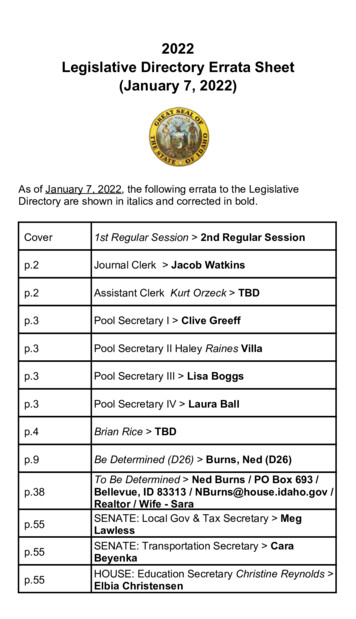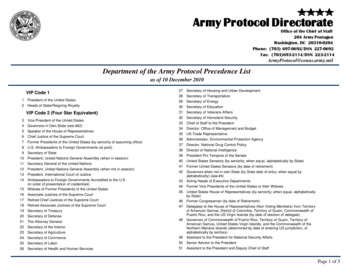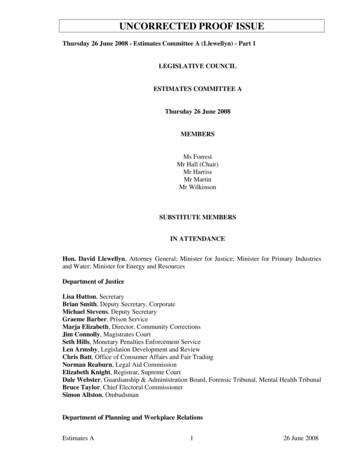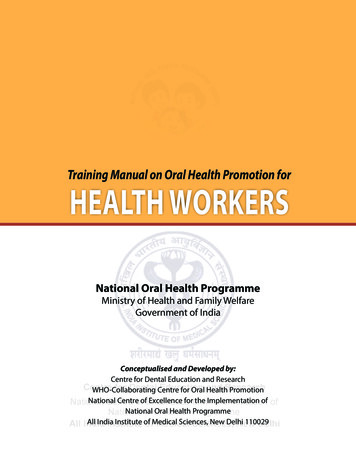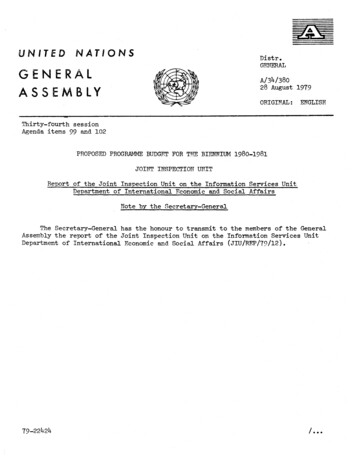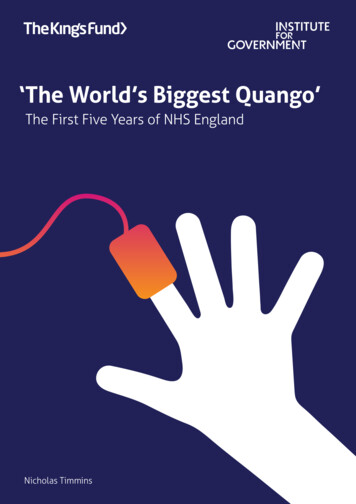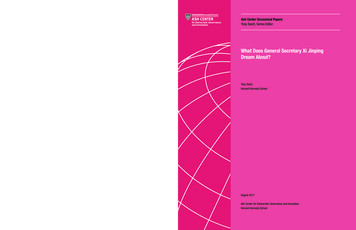
Transcription
Ash Center Occasional PapersTony Saich, Series EditorWhat Does General Secretary Xi JinpingDream About?Ash Center for Democratic Governance and InnovationHarvard Kennedy School79 John F. Kennedy StreetCambridge, Massachusetts 02138Tony SaichHarvard Kennedy SchoolT 617.495.0557F 617.495.4948www.ash.harvard.eduAugust 2017Ash Center for Democratic Governance and InnovationHarvard Kennedy School
Ash Center Occasional Papers SeriesSeries Editor Tony SaichDeputy Editor Jessica EngelmanThe Roy and Lila Ash Center for Democratic Governance and Innovation advances excellence and innovation in governance and public policy through research, education, and public discussion. The FordFoundation is a founding donor of the Center. Additional information about the Ash Center is availableat www.ash.harvard.edu.This research paper is one in a series funded by the Ash Center for Democratic Governance andInnovation at Harvard University’s John F. Kennedy School of Government. The views expressed in theAsh Center Occasional Papers Series are those of the author(s) and do not necessarily reflect those ofthe John F. Kennedy School of Government or of Harvard University. The papers in this series areintended to elicit feedback and to encourage debate on important public policy challenges.This paper is copyrighted by the author(s). It cannot be reproduced or reused without permission.
Ash Center Occasional PapersTony Saich, Series EditorWhat Does General Secretary Xi JinpingDream About?Tony SaichHarvard Kennedy SchoolAugust 2017Ash Center for Democratic Governance and InnovationHarvard Kennedy School
Executive SummaryThis analysis argues that the period of easy reforms in China has ended, andthe time of difficult reforms that touch core political interests has begun.The resulting challenges facing the Chinese Communist Party (CCP) generalsecretary Xi Jinping when he is confirmed for another five-year-term spanpolitical, economic, and international spheres. This leadership must bothmaintain a domestic focus to strengthen economic growth and avoid the“middle-income trap,” while also engaging in a host of regional and globalactions to cement China’s position on the world stage. Internally, Xi has consolidated significant political power, and this has created significant tensionamong vested interests and competing centers of influence. Externally, forthe first time in several centuries, the largest economy in the world is notWestern and will be under a leadership that does not share the same consensual values and political structures as those in the West. Xi has outlinedseveral priorities, including: increased CCP control over state and society;the promotion of traditional Chinese culture; the importance of Marxism asa guiding principle; historical revisionism and censorship; the promotion ofnationalism; and the pursuit of an aggressive national anti-corruption campaign. Given these goals and sets of challenges, the outcome in China isuncertain and there exist a range of possible scenarios.The most attractive for the West would be an increase in social diversity andan accommodation with society to form a new social compact. However, itis difficult to see what would cause the current elite willingly to reject theexisting beneficial system. A more unpredictable outcome would be chaotic pluralization in which democracy is not entrenched and elites and theirfamilies continue to benefit from their political connections to privatizepublic wealth. An alternative over the short to medium term would be thecontinuation of the fluctuation of soft and harder authoritarianism that wouldmake bold initiatives unlikely. Rarely does a transition occur during a periodof economic growth and is more likely to occur with the system under stress.As a result, the emergence of an illiberal democracy would be quite plausibleunder this final scenario.iii
ContentsWhat Does General Secretary Xi Jinping Dream About? . . . . . . . . . . . . . . . . . . . . . . . . . . . . 1Xi Jinping—The “Core” of the CCP Leadership . . . . . . . . . . . . . . . . . . . . . . . . . . . . . . . . . . 2Policy Priorities. . . . . . . . . . . . . . . . . . . . . . . . . . . . . . . . . . . . . . . . . . . . . . . . . . . . . . . . . . . 4Economic Priorities. . . . . . . . . . . . . . . . . . . . . . . . . . . . . . . . . . . . . . . . . . . . . . . . . . . . . . . . 7China’s Global Role. . . . . . . . . . . . . . . . . . . . . . . . . . . . . . . . . . . . . . . . . . . . . . . . . . . . . . . 11Can Xi’s Dream Come True? . . . . . . . . . . . . . . . . . . . . . . . . . . . . . . . . . . . . . . . . . . . . . . . . 14Concluding Comments . . . . . . . . . . . . . . . . . . . . . . . . . . . . . . . . . . . . . . . . . . . . . . . . . . . . 18Notes. . . . . . . . . . . . . . . . . . . . . . . . . . . . . . . . . . . . . . . . . . . . . . . . . . . . . . . . . . . . . . . . . 21
What Does General Secretary Xi Jinping Dream About?By the end of 2017, Xi Jinping will have been confirmed as general secretaryof the Chinese Communist Party (CCP) for another five-year term. He hascome a long way since he was first appointed in November 2012, accumulating and consolidating power swiftly and dominating the political discourse.On assuming power, Xi clearly felt that the challenges facing China were sosevere that drastic measures were required. Politics had to take preferenceover economics and there was the need for a fundamental shift in the development strategy. To meet his objectives, a disciplined, unified party wascrucial to push through the next phase of reforms. The critical questions arewhether Xi will be able or willing to use this accumulated power effectivelyand to what purpose. Since the death of Deng Xiaoping (February 1997),each succeeding leader has enjoyed a reduced level of authority as the systemsettled into one of collective leadership. Xi has reversed this trend.At a simplistic level, Xi’s overriding objective is to maintain CCP rule butthis does not tell us very much. Again, the question arises as to what is hegoing to do? Minzer argues that, in 2012, politics appeared frozen with economic and institutional reform seemingly frustrated by the vested intereststhat dominated the CCP.1 In significant respects, Xi Jinping has broken withthe existing norms and rules that saw senior party officials dividing poweramong themselves and sustaining elite stability through a balance of powerbetween the different groups. Below, we look at Xi’s dream with respect topolitics, economics, and China’s global role and provide an initial assessmenton how realizable the dream may be.The new leadership that will be selected in late-2017 together with Xi willface a set of daunting challenges to maintain stable economic growth andto cement China’s position within the global and regional community.Domestically, China needs reform to ensure that it can avoid falling into the“middle-income trap.” China’s own leaders admit that the economic development model that has proved successful in the past is no longer suitable as thenation attempts to shift to consumer-led growth and higher-quality production. The nature of China’s growth has created severe pollution, not only forair quality but also even more importantly for water and soil. In addition,during the reform years (1978–present), China has gone from being one ofthe most equal countries in Asia to one of the most unequal. These issueshave caused periodic unrest and certainly pollution has been of concern tothe growing, urban middle class. Add to this the task of integrating several1
What Does General Secretary Xi Jinping Dream About?hundred million people into new and old urban environments, and the domestic challenges are indeed daunting.Externally, China’s new leadership will also have to make significant decisions that will define the nation’s place in the world. Under President Trump,the US administration would appear to be withdrawing from its previousrole within the region and leadership with respect to global challenges suchas climate change. The new leaders will have to decide to what extent Chinamay wish to fill this growing leadership void. Whether its leaders acknowledge it or not, China’s increasing economic power and associated influencemean that it is involved in the internal affairs of other countries. This willincrease as the “One Belt One Road” (OBOR) program gets up and runningand with the expansion of the Asia Infrastructure Investment Bank (AIIB).In addition, there are very specific challenges that derive from the nucleardevelopment of North Korea, how China will deal with different perceptionsof its territorial claims in the East and South China Seas, and how to managethe US-China relationship under an inconsistent President Trump. Last butnot least, with the US withdrawing from the Trans-Pacific Partnership (TPP),the question arises about the extent to which the new leadership will promotethe Regional Comprehensive Economic Partnership (RCEP) and can fill thevoid and determine the norms for trade and investment in the Asia region.Xi Jinping—The “Core” of the CCP LeadershipXi Jinping has consolidated his power over the last five years since hisappointment as general secretary at the 18th Party Congress (November2012). Potential rivals in the party apparatus such as Zhou Yongkang andthose in the military such as Guo Boxing have been arrested and their influence eliminated. Most recently, in the run-up to the Congress, Chong qingparty secretary, Sun Zhengcai, was removed from his post amid accusationsof improper conduct.2 Xi has taken over as head of the key party leadinggroups dealing with economic, financial, and international affairs. Xi’ssupport from the party hierarchy was surprising initially because whenelections were held for the 15th Party Congress (1997), he received thelowest vote among the incoming alternate members of the CCP CentralCommittee (CC), in part as a protest against the elevation of “princelings”(the children of high-ranking officials). As the preeminent “princeling,”he now dominates the party and the central decision-making apparatus toan extent unprecedented since Mao Zedong. His pre-selection image as a2
What Does General Secretary Xi Jinping Dream About?reliable troubleshooter was enhanced in February 2008 when he successfully took on oversight of the 2008 Summer Olympic Games from formerBeijing Municipality Party Secretary Liu Qi. As a result, Xi was chargedwith overseeing the events for the 60th anniversary of the founding of thePeople’s Republic of China.In the run-up to the 19th Party Congress (October/November 2017), fivepivotal events have made clear Xi’s preeminence in the system and attestnot only to his continuation as general secretary but also to the fact that hewill have a strong say over appointments of members of the Politburo andits Standing Committee. Four members out of seven of the Standing Committee will step down and possibly five, while a further six members of the25-person Politburo are likely to be replaced.1. At the Sixth Plenum of the 18th CCP CC (October 2016), Xi was namedas the “core” of the party leadership. This is an important designation inthe Chinese system, indicating his dominance in the political hierarchy.Since this announcement, there has been a steady stream of military andcivilian leaders who have all pledged allegiance to Xi. It places him in adirect line of leadership following Mao Zedong, Deng Xiaoping, and JiangZemin. It is noticeable that his predecessor, Hu Jintao, was not awardedthis appellation. It marks a step back from the more collective decisionmaking style and process that marked the Hu and Wen Jiabao years(2002–2012) to one with a preeminent leader at the core, the “chairman ofeverything.”2. In January 2017, the Chinese press published comments of Xi’s from thatPlenum in which he accused five senior members of the party of having engaged in “political conspiracies.”3 This moved beyond the earlieraccusations that the five were “greedy financially” and “corrupt in theirlifestyles.” The five are: Zhou Yongkang (Politburo Standing Committee member and in charge of law and order), Bo Xilai (Chongqing partysecretary and Politburo member), Guo Boxiong (vice-chair of the CentralMilitary Commission and Politburo member), Xu Caihou (vice-chair ofthe Central Military Commission and Politburo member), and Ling Jihua(member of the Central Secretariat and said to be close to Hu Jintao). Thepublication of these comments served as a warning to others in the partywho might think of challenging him and served as an expression of hisconfidence in the strength of his position.3. The National People’s Congress meeting in March 2017 was noticeablefor the dominance of Xi over proceedings rather than that of the premier,3
What Does General Secretary Xi Jinping Dream About?Li Keqiang. This is a government meeting but the CCP received some 30mentions, more than at any time since reforms began in the late-1970s. Xi,himself, was mentioned eight times while the “core” was mentioned 11times.4 Given that the work report outlines economic objectives, it is noteworthy that the economy was mentioned 64 times as opposed to around80 in previous reports. This reflects Xi’s preference for dominance of theparty over state and society.4. In early 2015, the party began to promote Xi Jinping’s policy slogan of the“Four Comprehensives.” Each leader needs a slogan that encapsulates hisprimary contribution to the ideological pantheon and, in all probability, thiswill be incorporated into the Party Statutes at the Congress. The “Four Comprehensives” are: comprehensively build a moderately prosperous society,deepen reform, govern the nation in accordance with law, and govern strictlythe party. While the first three would be familiar to previous party leaders inthe reform era, the fourth clearly shows Xi’s concern for party dominanceand his campaign to control the corruption and lax practices that he sees ashaving damaged the party’s reputation in recent years.5. In the immediate build-up to the Congress, Xi has been consolidatinghis position by removing rivals and promoting allies. The most noticeable is the removal of Chongqing party secretary, Sun Zhengcai, and hisreplacement with Xi associate, Chen Min’er. Sun had been considereda potential future general secretary of the CCP. Earlier in May, 2017,another Xi acolyte, Cai Qi, was moved from the position of mayor ofBeijing to party secretary.Policy PrioritiesIt is evident that the majority of the party leadership felt that Xi was a trustworthy pair of hands who would ensure continued party rule and maintainits preeminent position, while restoring its credibility and support among thepopulation at large. It was up to Xi and the new leadership to find a new basisfor legitimacy that combined both traditional mechanisms and new methods.Xi clearly decided that for the party to remain in control, he needed to regaincontrol over the apparatus and be willing to prioritize political issues overthe continued restructuring of the economy. Ideally, he would have liked theanti-corruption campaign and economic reform to go hand in hand. Cleaning up the image of the CCP was crucial if the party was to retain its grip onpower. He and his colleagues have centralized power and decision making as4
What Does General Secretary Xi Jinping Dream About?much as possible with the result that Xi has greater formal control over thepolicymaking apparatus than did his predecessors. He does not trust government or society to carry out his reform ambitions. This has advantages,but also drawbacks. Many complain of a paralysis within government andthe party as local officials may decide it is safer to do nothing rather thanapprove investment or other decisions that might subsequently lead to accusations of misuse of power.The reform proposals laid out during the Third Plenum of the 18th CCP CC(November 2013) were wide ranging and promised progress on a vast arrayof areas. It has been impossible to deliver on all of them. Thus, the newleadership appointed at the 19th Party Congress will have to decide on whichspecific policies are crucial to push ahead with and which can be left asideuntil a later date. Failure to decide on priorities will entrap the leadershipin too many policy fights, dissipate energy, and lead to possible frustrationamong the populace that too much has been promised with little delivered.The leadership has a clear set of policy priorities for politics, economics, andinternational affairs that comprise what Xi terms the “China Dream” andthe “rejuvenation of the Chinese nation.” Xi and his supporters believe thatthe CCP is the best organization to push ahead with reforms and to maintainstability. There is a seven-part political strategy:a) To ensure that the CCP exerts as extensive control over state and society as is feasible and that mechanisms have been developed to overseeeffectively new realms such as social media and nongovernmental organizations (NGOs). Xi has made it clear that complete obedience to theparty is expected not just from party members but from other membersof society. Given, of course, Xi’s dominance of the party, in practice thismeans absolute obedience to himself. To meet this objective, there havebeen new regulations to tighten control over new social media, vehiclesfor expression have been limited, and human rights lawyers persecuted. InFebruary 2016, when visiting three top media institutions, Xi stated thateditors and reporters must pledge absolute loyalty to the CCP and closelyfollow its leadership in “thought, politics and action.”5 In December 2016,he delivered a similar message to the nation’s schools and universities. Xiclaimed that adherence to the party’s leadership was essential and that universities should be built into “strongholds that adhere to party leadership.”6Recently, inspectors have been sent to China’s top universities to insurethat teachers are not making “improper” remarks in class. Tough restrictions have been placed around foreign NGOs operating in China, while the5
What Does General Secretary Xi Jinping Dream About?new Charity Law seeks to control the flow of new wealth. The intentionnot only is to regulate the sector but also to encourage more giving bythe wealthy to sectors prioritized by the CCP, while restricting giving toadvocacy-based projects. The new framework loosens the requirements forregistration but tightens subsequent oversight and enhances party control.7b) The promotion of traditional Chinese culture. With the talk of moraldecay in China and the lingering influence of what is termed “Westernliberal values,” the leadership has turned to a selective interpretationof traditional culture (especially Confucianism) to bolster its appeal tosocialism and to portray the CCP (not the Kuomintang on Taiwan) as thegenuine inheritors of the imperial past. Xi has noted that the CCP is the“successor to and promoter of fine traditional Chinese culture.”8 This isremarkable as when the CCP took power in 1949, and especially duringthe Cultural Revolution (1966–69), it portrayed itself as representing aradical break with the past.c) At the same time, the leadership has stressed the importance of Marxismas a guide to action for party members. In December 2013, Xi orderedall party members to study Marxist philosophy as the theories still had a“strong vitality and serve as powerful arms of thought for guiding communists to make progress.” On the 95th anniversary of the founding of theCCP, Xi called on party members not to “betray or abandon” Marxism.9This was part of the efforts to shift party members from obsessions withGDP growth and compiling individual wealth.d) As a child of one of the founders of the People’s Republic of China, Xi isa proud member of the achievements of the CCP and has criticized thosewho have sought to undermine its image and separate out the years of MaoZedong’s rule from those of the reform era. This has led to a clampdownon critical research and the publication of academic accounts that havesought to minimize the damage caused by movements such as the “GreatLeap Forward” (1958–60). There have been attacks on domestic and international historians who have promoted “historical nihilism,” that is, thosewho have not followed the official account of Chinese party history.e) There have been attempts to exert greater control over society, to restrictthe extent of intellectual criticism, and to limit the influence of “Westerntheories and ideas.” An internal document from April 2013 criticized arange of ideas that were current such as: constitutional democracy, universal values, neoliberalism, and historical nihilism.10f) What has been very noticeable is that after assuming power, Xi launcheda movement for officials to practice more frugal behavior (encapsulatedin the slogan “four dishes and a soup”) and the strongest campaign in6
What Does General Secretary Xi Jinping Dream About?recent memory against corruption within party and government ranks.This started before the leadership turnover when the removal of Chong qing party secretary Bo Xilai paved the way for Xi’s ascendancy. Underthe slogan “catching tigers and flies,” the campaign has broadenedbeyond what some observers saw as a factional struggle to net at leastone senior leader in every provincial unit in China. Over 120 senior officials have been arrested, including five national leaders with the biggest“tiger” caught being Zhou Yongkang, a former member of the PolitburoStanding Committee and overseer of the domestic security system.However, it was reported in January 2017 that the number of officialsturned over to the court had dropped by 20 percent to around 11,000.11The campaign is viewed as crucial to efforts to ensure that the CCP willfunction effectively and to restore the public’s faith in the organization.Xi, with the enthusiastic support of his Standing Committee ally WangQishan, wants to use the momentum to attack corrupt behavior withinthe elite of those who are not necessarily factional enemies. This is adangerous path to follow and may cause a backlash within the party thatcould weaken Xi’s position and undermine other aspects of his intendedreform program. The post-19th Party Congress top leadership will haveto decide whether to accept this focus on corruption and the centralization of power in Xi’s own hands. Given his apparent control over theapparatus in advance of the Congress, it seems most likely that thosechosen will follow his lead.g) The promotion of nationalism has accompanied the revival of traditional culture to bolster regime legitimacy. Key to this process has beento identify the nation with the party to make criticism of party policyunpatriotic. This has been accompanied by a more assertive posture overterritorial issues.Economic PrioritiesClearly, the economic model of development that had produced stronggrowth for more than three decades has run its course. It is difficult to seestate investment rising further, neither is an increase in exports likely. Thiscalls for greater reliance on consumption as a driver of growth. Liu Shijin,a former vice-minister of the Development Research Center of the StateCouncil has commented, “The end has come to the period of purely ‘quantitative expansion’ and of extensive cultivation for meagre returns.” The neweconomic priorities were laid out most explicitly at the December 2013 ThirdPlenum of the 18th CCP CC. What is most remarkable about the priorities7
What Does General Secretary Xi Jinping Dream About?is that they are almost identical to those put forward in 2002–03 when HuJintao and Wen Jiabao took over power. This shows how difficult it is tocomplete such a transition.While most foreign observers focused on the stress on the role of the market,the document also contains a clear emphasis on the role of the state-ownedenterprises (SOEs) and state engagement in economic development. Thishas led some observers to refer to the approach as “state capitalism,” whilethe Chinese leadership refer to it as “socialism with Chinese characteristics” and more recently as “supply-side economic reforms.” Certainly, thecurrent Chinese leadership have developed an industrial policy and thispolicy is designed to ensure that the party retains control over key sectors ofthe domestic economy as well as having greater influence over investmentoutside of China. There is no doubt that gradually there has been greaterrecognition of the role of the market in producing efficiency gains and moreeffective use of investment funds. We can see the increasing emphasis on apositive role for the market in the sequential Five-Year Plans, culminating inthe 12th Plan (2011–2015) that stated the necessity of giving “full play to thesocialist mechanism as well as the market in terms of allocating resources.”In March 2013, Premier Li Keqiang stated that “the market is the creator ofsocial wealth and the wellspring of self-sustaining economic development.”Despite mention of the market, the current leadership and those likely to takeover at the 19th Party Congress see continued state guidance over economicdevelopment as crucial. First, there has been a consistent view that SOEreform should not result in wholesale privatization but rather in the development of national champions along the lines of industries in Japan and SouthKorea. This is also true for the approach of former Premier Zhu Rongji whosought to establish a stronger industrial policy and state oversight combinedwith the promotion of stronger market forces.Further strengthening the role of the state sector in the economy was thelaunch of the policy of “indigenous innovation” in 2006. This focused onindustries such as new-energy vehicles, high-end equipment manufacturing,biotechnology, and information technology. This retention of state dominanceover the domestic economy is also reflected in Chinese overseas investment.These major industries and pillars were part and parcel of the “going out”strategy that was to increase overseas investments and the expansion of theglobalization of Chinese enterprises. The state clearly intends to play a majorrole in Chinese overseas investment and to control more effectively the8
What Does General Secretary Xi Jinping Dream About?buying spree and mergers and acquisitions of recent years. With the slowingof the domestic economy, both private enterprises and SOEs looked to investabroad, on occasion buying at inflated prices. This created fears of capitalflight. Temporary limits were placed on the scale of overseas transactionswith those over 10 billion generally banned and over 1 billion if the projectfell outside of the core focus of the business. That the state will take a moreactive role is shown by the establishment of the AIIB and the large OBORprogram. These projects, which are designed to promote China’s internationalinterests, will clearly favor major state-owned enterprises; indeed, onepurpose is to enable them to export excess capacity and set up productionfacilities overseas.There are eight key components of the strategy:a) The Chinese leadership has announced the “New Normal” for the economy. This means that they are striving for more sustainable and balancedgrowth. The days of double-digit growth are over and the expectation isfor GDP growth in 2017 of around 6.5 percent, the slowest growth rate in26 years.b) Most recently, the phrase “New Normal” has been eclipsed by that of“supply-side economic (or structural) reform.” This should not be confused with President Reagan’s policies of the 1980s. The main elementsare: cutting excess capacity, especially in steel production (Chineseexports have roiled global markets and upset President Trump); closingdown some of the “zombie” SOEs, but subsidizing a smaller number offavored and often inefficient industries; and tax breaks for new industriessuch as electric vehicles and eco-friendly agriculture. It reflects Xi Jinping’s push for stronger central control by the CCP over the economy.c) The promotion of consumption as the primary driver of economic growth.As noted, the two previous main drivers of growth, state-led investmentand export-led growth, cannot continue to stimulate high growth and,while they will remain major factors, they need to be supplemented by theincrease in domestic consumption. This shift will contribute to the lowergrowth rates moving forward.d) In turn, this will be aided by a more judicial use of market forces to allocate resources and capital. The Decision of the 3rd Plenum of the 18thCCP CC noted that the prices of water, oil, gas, electricity, transportation,and telecommunications would all be set by the market. However, morerecently, the National Development and Reform Commission has reasserted its production targets for key products.9
What Does General Secretary Xi Jinping Dream About?e) Reform of the state-owned sector was to be strengthened but, in terms ofmarket pricing, the Decision made no mention of breaking up the SOEmonopolies that dominate these sectors. Subsequent reforms have notprogressed far and the political power of the sector remains strong. It is alsothe case that the CCP leadership does not necessarily mean that SOE reformshould lead to large-scale privatization or liberalization but rather to allowthem to contribute to the CCP’s political standing more effectively.f) Financial sector reform. Many of the key leaders from Zhu Rongji’s teamhave been kept in place, with the noticeable except
Cambridge, Massachusetts 02138 T 617.495.0557 F 617.495.4948 www.ash.harvard.edu Ash Center Occasional Papers . Foundation is a founding donor of the Center. Additional information about the Ash Center is available . may wish to fill this growing leadership void. Whether its leaders acknowl-
